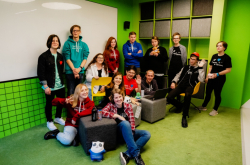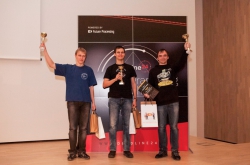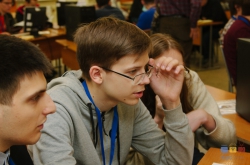The contest used the popular Stepik educational platform and was divided into two stages: the qualification round which lasted one week, and the finals. To get into the finals, participants had to earn 600 points by solving two types of tasks. The first type implied exact answers; to solve those it was necessary to write a code using one of programming languages. Second type tasks were on finding the more appropriate solution for a test and uploading it into a system.
As Vitaliy Aksenov notes, Bioinformatics Contest 2017 could well be the world's first contest in bioinformatics. Both the contest's format and tasks are unique.
"Until now, there weren't any bioinformatics contests in the world. There were only archives of tasks (for instance, there is such an archive on the Rosalind educational platform). Yet, on Rosalind, there are only tasks that imply a precise answer. We, on the other hand, decided on a different format. After Nikolai Vyahhi from the Bioinformatics Institute proposed to collaborate on a contest in bioinformatics, we've discussed the situation and understood that bionformatics is not exactly an exact science. For example, how to define with a 100% probability whether someone has cancer or not? Sooner or later, there will be a way, yet still there isn't. That is why we had to devise such tasks that won't have an exact solution, some comprehensible algorithm. We needed something which can be answered, say, on 75%, not 100%", shares Mr. Aksenov.
 A damaged DNA sequence. Credit: anh-usa.org
A damaged DNA sequence. Credit: anh-usa.org
Thus, apart from tasks with precise answers, the participants had to solve four tasks of this kind. One, for instance, implied using algorithms, specialized libraries and frameworks to define the altered part in the DNA of a particular genetically modified plant or animal. Another was on defining which proteins control reactions in a cell. These tasks were created by ITMO's graduates and students — Alexei Sergushichev, Vitaliy Demyanuk, Anna Malova and Artem Vasilyev, who work in bioinformatics, and Vitaliy Aksenov, Ilya Zban and Grigoriy Shovkoplyas, who act as supervisors of different internet contests on programming.
All in all, participants of the final round had 24 hours for everything. They were provided with different instruments that specialists in bioinformatics use: libraries and special frameworks, the only condition being to not get help from others. Mr. Aksenov notes that the competition has already become international: programmers and specialists in bioinformatics from Russia, USA, Europe, China and India participated in it.
All in all, 379 participants of the 3000 who registered got into the finals. Less than a half, only 177, made it to the last round, where the 20 best were chosen by the jury. Gennadiy Korotkevich, ITMO's student and twice champion of the ACM ICPC, became champion with 7218, having got ahead of the 2nd place Timon Knigge from Netherlands by almost 300 points.
 ITMO University. Gennadiy Korotkevich
ITMO University. Gennadiy Korotkevich
"The top five positions were taken by programmers who are widely know for winning different contests. Yet, beside sports programmers, many specialists in bioinformatics, PhD students and accomplished scientists also took part in the event, comments the contest's coordinator. Among those who registered for the qualification round were even "pure" biologists who don't know much about programming, as well as novice specialists. From the 3000 participants who registered for the qualification round, less than 800 could solve at least one task, and even less got into the finals".
Next year, the event's organizers plan to continue with the contest, though there will be a need to develop new tasks; bionformatics institutions and companies that do corresponding research may be of help here.
We'd like to note that such contests are something new to Russia. Two years ago, Russia's first hackathon took place in Moscow, and recently a similar event was conducted in St. Petersburg, hosted by ITMO University — Russia's first hackathon in bioinformatics BioHack, that lasted for 48 hours and gathered 24 teams.





